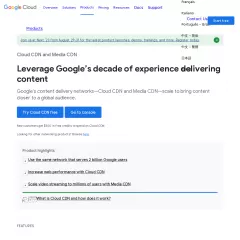Google Cloud CDN 
Google Cloud CDN is used by 1.59% of sites
Official Website
https://cloud.google.com/cdnCategory
CDN
Cloud CDN (Content Delivery Network) is a service offered by cloud providers that helps deliver content to users with improved performance, scalability, and availability. It works by caching and distributing content across a network of servers strategically located in various geographic locations.
The key features and benefits of Cloud CDN include:
Improved Content Delivery: Cloud CDN caches static and dynamic content, such as images, videos, CSS files, and JavaScript, at edge locations closer to end-users. This reduces latency and improves content delivery speed, resulting in faster page load times and a better user experience.
Global Scalability: Cloud CDN leverages a global network of edge servers to serve content from the location nearest to the end-user. This allows for high scalability and the ability to handle sudden traffic spikes or increased demand without impacting the origin server.
Load Balancing: Cloud CDN can distribute traffic across multiple servers, optimizing resource utilization and providing load balancing capabilities. This ensures that content is efficiently delivered and avoids overloading any specific server.
DDoS Protection: Cloud CDN often includes built-in DDoS (Distributed Denial of Service) protection capabilities. By distributing traffic across multiple servers and filtering out malicious requests, it helps mitigate the impact of DDoS attacks, ensuring the availability of the content.
Cost Optimization: Cloud CDN can reduce bandwidth costs and server load by caching and serving content from edge locations. This reduces the load on the origin server and optimizes data transfer, resulting in cost savings for data transfer and infrastructure resources.
SSL/TLS Termination: Many Cloud CDN services provide SSL/TLS termination at the edge, offloading the resource-intensive cryptographic operations from the origin server. This enhances security and improves performance for secure connections.
Analytics and Monitoring: Cloud CDN often includes analytics and monitoring tools that provide insights into content delivery, performance metrics, and user behavior. These tools allow administrators to monitor and optimize content delivery based on real-time data.
Integration with Cloud Services: Cloud CDN seamlessly integrates with other cloud services, such as storage, compute, and serverless platforms, provided by the same cloud provider. This enables efficient content distribution and integration within the overall cloud infrastructure.
Cloud CDN services are offered by various cloud providers, including Amazon Web Services (AWS), Google Cloud Platform (GCP), Microsoft Azure, and others. Each provider has its own set of features, pricing models, and global network coverage.
Implementing Cloud CDN can significantly enhance the performance, scalability, and availability of web applications and content. It enables faster content delivery, better user experience, and efficient utilization of resources, making it a valuable component of modern web and application architectures.
The key features and benefits of Cloud CDN include:
Improved Content Delivery: Cloud CDN caches static and dynamic content, such as images, videos, CSS files, and JavaScript, at edge locations closer to end-users. This reduces latency and improves content delivery speed, resulting in faster page load times and a better user experience.
Global Scalability: Cloud CDN leverages a global network of edge servers to serve content from the location nearest to the end-user. This allows for high scalability and the ability to handle sudden traffic spikes or increased demand without impacting the origin server.
Load Balancing: Cloud CDN can distribute traffic across multiple servers, optimizing resource utilization and providing load balancing capabilities. This ensures that content is efficiently delivered and avoids overloading any specific server.
DDoS Protection: Cloud CDN often includes built-in DDoS (Distributed Denial of Service) protection capabilities. By distributing traffic across multiple servers and filtering out malicious requests, it helps mitigate the impact of DDoS attacks, ensuring the availability of the content.
Cost Optimization: Cloud CDN can reduce bandwidth costs and server load by caching and serving content from edge locations. This reduces the load on the origin server and optimizes data transfer, resulting in cost savings for data transfer and infrastructure resources.
SSL/TLS Termination: Many Cloud CDN services provide SSL/TLS termination at the edge, offloading the resource-intensive cryptographic operations from the origin server. This enhances security and improves performance for secure connections.
Analytics and Monitoring: Cloud CDN often includes analytics and monitoring tools that provide insights into content delivery, performance metrics, and user behavior. These tools allow administrators to monitor and optimize content delivery based on real-time data.
Integration with Cloud Services: Cloud CDN seamlessly integrates with other cloud services, such as storage, compute, and serverless platforms, provided by the same cloud provider. This enables efficient content distribution and integration within the overall cloud infrastructure.
Cloud CDN services are offered by various cloud providers, including Amazon Web Services (AWS), Google Cloud Platform (GCP), Microsoft Azure, and others. Each provider has its own set of features, pricing models, and global network coverage.
Implementing Cloud CDN can significantly enhance the performance, scalability, and availability of web applications and content. It enables faster content delivery, better user experience, and efficient utilization of resources, making it a valuable component of modern web and application architectures.